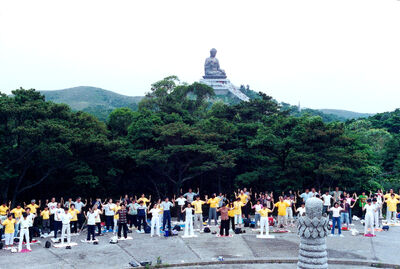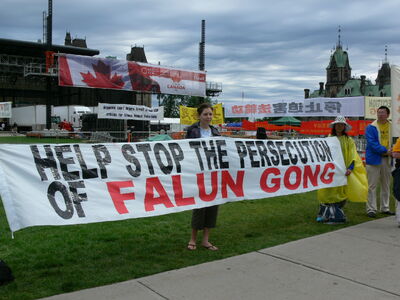Considered by many Buddhists and Hindus to be a cult, the Falun Dafa or Falun Gong, meaning Dharma Wheel

Falun Gong in Germany
Practice, is an ancient Chinese spiritual discipline in the Buddhist tradition. Pronounced "Fah-loon Gong," it consists of moral teachings, a meditation, and four gentle exercises that are a truly unique and highly effective way to improve your health and energy levels.
Core Values - Truthfulness, Compassion, Tolerance[]
At the core of Falun Gong are the values of Truthfulness, Compassion, and Tolerance (or in Chinese, Zhen 真 Shan 善 Ren 忍). Falun Dafa teaches that these are the most fundamental qualities of the universe, and takes them to be a guide for daily life and practice.In the words of Falun Gong’s founder, Mr. Li Hongzhi, “assimilation to the highest qualities of the universe—Zhen 真 Shan 善 Ren 忍 —is the foundation of practice. Practice is guided by these supreme qualities, and based on the very laws which underlie the development of the cosmos.”
Falun Gong is also commonly known as “Falun Dafa.”
Fastest Growing Religion in the World[]
By 1999, Falun Gong had grown to become the largest and fastest growing practice of the sort in Chinese if not world history. In just seven years since its 1992 introduction to the public, an estimated 100 million people were practicing Falun Gong. In Asia, spiritual practices of this variety are often referred to as ways of “cultivation,” or

“self-cultivation,” and form an integral part of classical Chinese culture. Various Daoist, Buddhist, and Confucian practices fit this rubric.Through consistent and dedicated practice, the student of Falun Gong comes to achieve a state of selflessness, greater insight and awareness, inner purity, and balance—the deeper workings of what might be called true health. Ultimately he or she approaches a state of spiritual attainment that in the Asian tradition is known as “enlightenment” or “attaining the Dao (Way).”
Unlike monastic paths of cultivation, Falun Gong is practiced in society, with students marrying, raising children, and pursuing a wide variety of careers. As such, while Falun Gong aspires to inner transformation of the self, it nevertheless typically translates outwardly into positive change in the world, insofar as the practitioner becomes a more patient family member, a more conscientious employee, or a more active member of society.
Awards[]
alun Gong has thus been the subject of many citations, awards, and proclamations, conferred by government officials and a variety of organizations. Many who practice Falun Gong have been the recipients of service awards in their communities and at their workplaces.
The practice’s founder, Mr. Li Hongzhi, is a five-time Nobel Peace Prize nominee and was nominated by the European Parliament for the Sakharov Prize For Freedom of Thought. He is the recipient of Freedom House’s International Religious Freedom Award.Eschewing the spotlight, Mr. Li guides the practice through his writings and occasional speeches, typically at Falun Gong conferences. Mr. Li has always insisted that the practice be taught for free and available to all, and as such, all Falun Gong books, video recordings, and the like are available for free viewing online.
Few people today are aware that Falun Gong and its followers received much in the way of official recognition in China during the 1990s, prior to a dramatic and violent change in political winds in 1999 which saw the practice persecuted.
In 1993, Mr. Li was named the “Most Welcomed Qigong Master” in Beijing and bestowed by an official body with the Award for Advancing Frontier Science.
The same year, The People’s Public Security News—the official newspaper of China’s Ministry of Public Security—praised Mr. Li for his contributions “in promoting the traditional crime-fighting virtues of the Chinese people, in safeguarding social order and security, and in promoting rectitude in society.”
By 1999, Chinese officials went so far as to quantify Falun Gong’s benefits, such as when one official from China’s National Sports Commission, speaking with U.S. News & World Report, declared that Falun Dafa “can save each person 1,000 yuan in annual medical fees. If 100 million people are practicing it, that’s 100 billion yuan saved per year in medical fees.”
The same official went on to note that, “Premier Zhu Rongji is very happy about that.”
Today Falun Gong is practiced in more than 70 countries around the world, with clubs and associations existing in a range of cities, companies, universities, and other settings.
There might very well be one coming soon to a park near you.
Persecution of Falun Gong[]
The persecution of Falun Gong refers to the campaign initiated by the Chinese Communist Party against

practitioners of Falun Gong since July 1999, aimed at eliminating the practice in the People's Republic of China. According to Amnesty International, it includes a multifaceted propaganda campaign, a program of enforced ideological conversion and re-education, as well as a variety of extralegal coercive measures, such as arbitrary arrests, forced labour, and physical torture, sometimes resulting in death.Falun Gong is a qigong discipline combining slow-moving exercises and meditation with a moral philosophy centered on the tenets of Truth (or Truthfulness), Compassion, and Tolerance. It was founded by Li Hongzhi who introduced it to the public in May 1992, in Changchun, Jilin. Following a period of meteoric growth in the 1990s, the Communist Party launched a campaign to "eradicate" Falun Gong on 20 July 1999. An extra-constitutional body, the 6-10 Office was created to lead the suppression of Falun Gong. The authorities mobilized state media apparatus, judiciary, police force, army, education system, families, and workplaces against the group. The campaign, driven by a large-scale propaganda through television, newspaper, radio and internet, urged families and workplaces to actively assist in the campaign. There are reports of systematic torture, illegal imprisonment, forced labour, and psychiatric abuses, with the apparent aim of forcing practitioners to recant their belief in Falun Gong. Foreign observers estimate that since 1999, hundreds of thousands, and perhaps millions of Falun Gong practitioners have been detained in "re-education through labor" camps, prisons, and detention facilities for refusing to renounce the spiritual practice. Former Chinese prisoners, many of whom are not themselves Falun Gong adherents have reported that Falun Gong practitioners consistently received the "longest sentences and worst treatment" in labor camps, and in some facilities, Falun Gong practitioners were the substantial majority of detainees. At least 2,000 Falun Gong adherents have been tortured to death amidst the persecution campaign, with some observers putting the number much higher.Since 2006, there have also been persistent, but as-yet unproven allegations that the vital organs of non-consenting Falun Gong practitioners have been used to supply China's organ tourism industry. The United Nations Committee on Torture called for China to schedule an independent investigation into the allegations.
